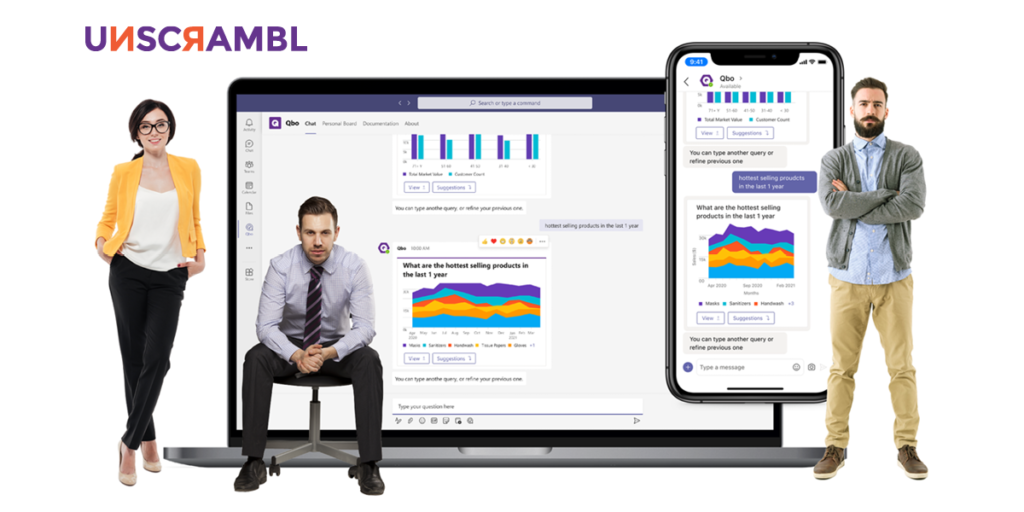 6 Minutes
6 Minutes

6 Ways Augmented Intelligence Can Transform the Fintech Industry
With a record $40.6 billion investment in 2018, fintech companies are poised to continue growing and reach new heights even amidst the COVID-19 pandemic.
As the world starts favoring remote work and consumer behavior moving towards digital experiences, fintech companies are experiencing sustained growth – but with that comes unique challenges that have to be solved.
Due to the financial nature of the industry, fintech companies are subjected to ever-increasing regulations from authorities while having to compete in a space where building customer trust is paramount to success. Thankfully, the solution to better innovation, staying ahead of the curve, and better regulatory compliance lies in the data generated within the companies themselves.
Getting Insights from Data Is Key – Doubly so for Fintech Companies
While fintechs are disrupting the current paradigm of traditional banking and financial services, success brings with it serious challenges.
Fintech companies have to comply with the various financial regulations imposed on them by the countries that they operate in, from anti-money laundering regulations to KYC compliance checks.
Failure to do so could see the company suffer financial penalties or worse, get shut down.
It is easy to assume that in a digital era, only speed and efficiency are prized by customers – but that isn’t always the case.
Customers, new to financial products and activities, such as investing value a friendly user experience above all.
The reason why they are shunning traditional banking to give fintech apps a try is exactly what fintech companies must focus on.
This includes:
- Transparency in prices & fees
- Fast & efficient customer service
- Innovative products tailored to a customer’s profile
All these have to be accomplished, while still preserving the core principles of financial services such as security and confidentiality.
Fintech organizations will have to effectively utilize the data they are generating from the interactions with their customers and the market as a whole to innovate further.
Utilizing augmented intelligence, organizations will be able to better make data-driven decisions to improve everything from customer interactions to maximizing revenue opportunities.
The Importance of Augmented Intelligence in Fintech
Augmented intelligence is a branch of artificial intelligence whose main focus is to enhance human interactions – especially in decision making.
With the rise of business intelligence tools such as dashboards, users are doing their best to process huge amounts of data and analyzing them to gather actionable insights.
However, to carry this out, it would require extensive investments into teams of data analysts and data scientists which is expensive (especially for startups) and still be rather inefficient.
Thankfully, combining the power of augmented intelligence into our analytical tools helps to automate business intelligence processes allowing for increased efficiency and widespread adoption throughout an organization.
Through augmented analytics’s machine learning and natural language processing (NLP) capabilities, fintech firms can now literally speak directly to their data and gain actionable insights on-demand!
6 Ways Augmented Intelligence Will Benefit Fintech
Through NLP, augmented analytics can be used throughout an organization and is highly flexible in delivering insights across the various categories of fintech companies.
Here are some use cases of how augmented analytics can help fintech companies innovate better and continue staying competitive.
1. Helping Insurtech Companies Develop More Competitive Products
Traditional insurance has always been about selling policies that group people into general risk categories so that overall, the insurance companies are profitable.
On the flip side though, that means certain groups of people might be paying higher premiums than is necessary. Insurtech companies are disrupting this by offering more competitively priced policies by analyzing the data of their customers.
Augmented intelligence allows insurtech companies to better overcome their challenges, equipping them with the ability to:
- Better analyze claims data to understand payout risk
- Identify fraudulent behavioral patterns
- Make underwriting more efficient by flagging potential errors
Through the conversational nature of augmented intelligence, business leaders can gain actionable insight by simply asking questions such as:
“Which age group is currently paying the highest premiums while also making the least claims?”
This allows data-driven decisions to be made, from doubling down on marketing to highly profitable customer groups to making unpopular policies more competitive.
2. Helping Payment Companies Prevent Fraud
As fintech money transfer payment companies process more transactions, incidents of fraud will inevitably increase.
Fintech companies must ensure that any suspicious merchants or buyers are promptly identified and dealt with.
Through augmented intelligence, huge datasets can be effectively analyzed to flag suspicious activity accounts, helping to reduce the risk of fraudulent purchases and subsequent chargebacks.
By analyzing the data of their accounts and through machine learning, augmented intelligence will be able to increasingly better identify accounts that are at risk of unauthorized payments (or currently compromised) from commonalities found across the customer dataset.
Key risk indicators can be continuously monitored and business leaders on the ground can immediately conduct instant audits by asking questions to their data such as:
“What is the trend of chargebacks from users in Singapore over the last 12 months?”
Insights like these allow companies to better keep their platform safe and secure through data-driven decision making.
3. Helping Robo-advisory Companies Reduce Their Customer Acquisition Cost
While robo-advisory firms are starting to disrupt the traditional model of investment, this comes at a steep cost to the companies themselves.
By offering low management fees of between 0.25% to 0.5% of the assets under management (AUM), robo-advisory companies are finding it harder to break even.
From Schwab Intelligent Portfolios to Acorns, robo-advisors have low entry minimums of just $500 which sounds attractive to beginner investors but is a challenge to the companies themselves.
According to HSBC, robo-advisors need to manage up to US$21.5 billion to break-even and that means acquiring as many customers as possible in a way that is financially sustainable.
Through augmented intelligence, analytics can be applied to identify key areas on the marketing front that can be optimized to acquire customers profitably.
Questions such as “Which marketing channels have the lowest cost per acquisition over the last 6 months?” can be asked to gain clarity and insight on their current marketing strategy.
Leaders will be able to make data-driven decisions on where to better allocate their marketing efforts to attract the most investment funds with the least amount of cost.
4. Helping Digital Banks Stay Compliant with Regulations
As digital banks fight hard for market share against the bigger and more entrenched big traditional banks, complying with financial regulations is a constant challenge.
A digital bank, after all, is still a financial institution that is dealing with monetary transactions from individuals and companies.
Due to its nature of being agile, digital banks are at risk of weaker customer due diligence and poorer customer transaction monitoring.
This causes challenges with global AML & CFT regulations which can mean hefty fines for violations that could have otherwise been prevented and resolved.
While big banks have huge IT departments and data experts to constantly monitor data and evolve their security protocols, digital banks just don’t have that luxury.
Thankfully, with augmented intelligence, digital banks can conduct real-time analytics and allow machine learning to consistently monitor and protect their customer transactions.
This allows for better know-your-customer (KYC) checks as well as monitoring key risk indicators in their user transaction behavior.
Questions such as “How many transactions exceeding $5 million were done over the last month?” can be asked, allowing users to constantly quickly detect and investigate any anomalies.
5. Helping Investment Platforms Spur Greater User Engagement
From Robinhood to MoneyLion, fintech investment apps are lowering barriers to entry into the investment game.
However, appealing to millennials and Gen-Zs brings with it unique challenges such as keeping these users constantly engaged on your platform.
Companies will need accurate insights on the behavior of their users interacting with their platform.
Thanks to augmented analytics, enormous amounts of behavioral data can be analyzed throughout the user experience journey to understand how users are responding to the interface and features.
This could mean making data-driven decisions with confidence such as:
- Making onboarding more simple and intuitive
- Adding more investment advisory content throughout the platform
- Enabling easier navigation to the most used features on the app
6. Helping Lend-tech Companies Make Better, More Intelligent Loans
Helping the under-banked areas of the world comes with challenges to approve loans quickly and accurately.
Unlike traditional financial institutions where loans are methodically approved using traditional benchmarks such as credit-scores and collaterals, lend tech companies have to rely on more obscure methods to determine creditworthiness.
This will mean underwriting loans using cell phone data, bill payment data, and even social connections – exactly how microlender Tala operates.
Augmented intelligence can help lend-tech companies create more accurate profiles of potential borrowers through the processing and analysis of various datasets.
Through conversational analytics, users can ask questions such as “Which age groups are defaulting on our loans over the last 12 months?” and gain insights on-demand on key areas that can be optimized.
Experience the Power of Augmented Intelligence & Analytics Today
With Qbo, fintech companies can now gain insights on-demand from their data without having to go through a steep learning curve.
Powered by conversational analytics, users can simply ask questions to their data and get back key insights that will help foster a data-driven culture.
The age of better decision making is here!
Embark on a free 14-day trial and experience the power of augmented analytics today.




